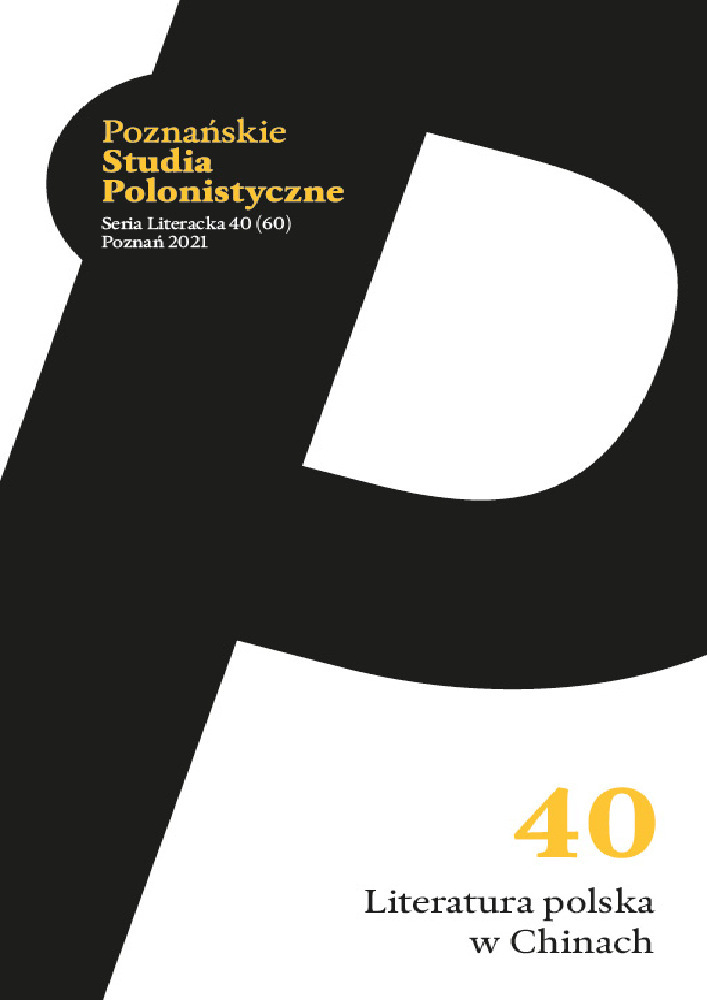Abstract
Polish literature has been present in China since 1906. The first Polish literary text translated into Chinese was Latarnik (The Lighthouse Keeper) by Henryk Sienkiewicz. Contemporary fans of Polish novella and novel were reading indirect translations since the Chinese novelists, who did not speak Polish, usually based their translations on the Japanese versions. In my years of contact with Chinese culture and literature, I have never come across any mention of translations of Polish or Eastern European children’s literature. Once I started my research into this subject, I quickly learned what caused the lack of information on it. It turned out that it was quite difficult to find any credible information on what has been translated, in what volume it was published and what the reactions of young readers were.
As a result, this article is merely an introduction to the research on Polish children’s literature in People’s Republic of China and focuses almost exclusively on latest publications, i.e. released in the twenty-first century. To a significant extent, it is based on data collected from people actively participating in promoting Polish culture in China via email. I received a lot of valuable data from Wojciech Widłak – one of the authors whose children’s books were published in China. The article is practically a short catalogue of books published on the Chinese market, but it also presents the few reviews I have managed to find in Chinese sources. There is also a presentation of the translators and it is worth noting that Polish children’s literature has been taken care of by the best among those studying Polish literature in China. I hope that this article will be the first of many on the position, popularity and reception of Polish children’s literature in China.
References
Adamski Mateusz [m.adamski@instytutksiazki.pl] (2020), Polska literatura dziecięca w Chinach (PTCP Chiny 1999-2019), do: Agnieszka Paterska-Kubacka [agpater@amu.edu.pl], 24 kwietnia, [korespondencja osobista].
Beijing International Book… (2015), [dostęp: 12 maja 2020], https://tinyurl.com/ee574f85.
Dakai Zhong-Dong Ou 16 guo duoyuan wenhua wanhuatong [Otwarcie wielokulturowego kalejdoskopu 16 krajów Europy Środkowej i Wschodniej] (2016), [dostęp: 14 maja 2020], https://www.sohu.com/a/111828718_268716.
Doktorzy Honorowi Uniwersytetu Gdańskiego (2020), [dostęp: 26 sierpnia 2020], https://tinyurl.com/vcs2zp7v.
Du le jiu hui aishang de shijie qi shu „Ditu (renwen ban)”, bu chumen rang haizi kan bian shijie! [Mapy – księga osobliwości świata, w której zakochasz się od pierwszego czytania, pozwoli dzieciom zobaczyć cały świat bez wychodzenia z domu] (2018), [dostęp: 12 maja 2020], https://cutt.ly/QmDHFas.
Guo Zheng eliza 2016 (2020), MAMOKO Mama Kan! Xin shu fabu. Wuzi huiben huo yinfa qinzi yuedu xin rechao [MAMOKO! Wychodzi nowy tom. Obrazkowe książki bez znaków mogą wywołać nową falę wspólnego czytelnictwa wśród rodziców i dzieci], [dostęp: 14 maja 2020], https://tinyurl.com/2fu3ebhv.
Hao Feifei [Anita; Feifei.Hao@msz.gov.pl] (2020), Polska literatura dziecięca w Chinach (Polish Literature for kids_published in Chinese), do: Agnieszka Paterska-Kubacka [agpater@amu.edu.pl], 28 kwietnia, [korespondencja osobista].
Instytut Polski Wydział Kultury… (2016), [dostęp: 26 sierpnia 2020], https://tinyurl.com/3v989n3y oraz https://tinyurl.com/yypwd3a6.
Jaśkowski Damian [Damian.Jaskowski@msz.gov.pl] (2020), Polska literatura dziecięca w Chinach (Children-literature), [do: Agnieszka Paterska-Kubacka (agpater@amu.edu.pl), 24 kwietnia, [korespondencja osobista].
Kaluta Izabella (2018), Instytut Książki na Beijing International Book Fair, [dostęp: 25 sierpnia 2020], https://tinyurl.com/cc7dd3vv.
Kaźmierczak Karol (2017), Milion książek polskich autorów sprzedanych w Chinach, [dostęp: 25 sierpnia 2020], https://tinyurl.com/3kfytemr.
Kong Xue, Zhao Zhen (2017), „Xiaoqiu Xiansheng” qidai shenmi hanxu de zhenli bei geng duo haizi gongxiang [Pan Kuleczka oczekuje, że coraz więcej dzieci będzie się wspólnie cieszyć ukrytą, tajemniczą prawdą], „Xin Jingbao Dianzi Ban” [„The Beijing News”], [dostęp: 1 września 2020], https://tinyurl.com/m52x44c3.
„Król Maciuś Pierwszy”… (2018), [dostęp: 25 sierpnia 2020], https://tinyurl.com/p59etaf8.
Li Yinan (2017), Literatura polska w Chinach, Wydawnictwo Uniwersytetu Śląskiego, Gnome, Katowice.
Nuoya (2015), Shou hui quwei kepu huiben „Dixia, shuixia” shoufa, kaiqi jiju xianchanggan de faxian tansuo zhi lü [Pierwsze wydanie ręcznie malowanej, zachwycającej, popularno-naukowej książki obrazkowej „Pod ziemią, pod wodą” rozpoczęło odkrywczą, badawczą podróż dającą poczucie „bycia na miejscu zdarzeń”], [dostęp: 12 maja 2020], https://tinyurl.com/kspk9rk.
Poloniści z Szanghaju… (2017), [dostęp: 3 września 2020], https://tinyurl.com/3etxeuft.
Polska na targach… (2012), [dostęp: 12 maja 2020], https://tinyurl.com/3f6tuh2p.
Polskie książki w Chinach (2016)7, [dostęp: 25 sierpnia 2020], https://tinyurl.com/6zmrb8bc.
Prokop Daria (2016), Język polski i kultura polska w Chinach, Instytut Filologii Polskiej Uniwersytetu Wrocławskiego, [dostęp: 3 września 2020], https://tinyurl.com/5486nyc4, [nieopublikowana praca magisterska].
Sajewicz Tomasz (2017), Polacy sprzedali ponad milion książek w Chinach, [dostęp: 25 sierpnia 2020], https://tinyurl.com/v6rymp6t.
Widłak Wojciech [wojwid@o2.pl] (2020a), Literatura dziecięca w Chinach, do: Agnieszka Paterska-Kubacka [agpater@amu.edu.pl], 22 kwietnia, [korespondencja osobista].
Widłak Wojciech [wojwid@o2.pl] (2020b), Literatura dziecięca w Chinach, do: Agnieszka Paterska-Kubacka [agpater@amu.edu.pl], 23 kwietnia, [korespondencja osobista].
Zhang Ling’er (2016), Tongxin wuguojie [Dziecięce serce bez granic], [dostęp: 14 maja 2020], https://tinyurl.com/mx2kwypc.
Zhao Gang (2010), Profesor Yi Lijun, „Postscriptum Polonistyczne”, z. 2 (6), s. 25-30.
License
Authors
Authors of texts accepted for publication in „Poznańskie Studia Polonistyczne. Seria Literacka” are required to complete, sign and return to the editor's office the Agreement for granting a royalty-free license to works with a commitment to grant a CC sub-license.
Under the agreement, the authors of texts published in „Poznańskie Studia Polonistyczne. Seria Literacka” grant the Adam Mickiewicz University in Poznań a non-exclusive, royalty-free license and authorize the use of Attribution-NoDerivatives 4.0 International (CC BY-ND 4.0)Creative Commons sub-license.
The authors retain the right to continue the free disposal of the work.
Users
Interested Internet users are entitled to use works published in „Poznańskie Studia Polonistyczne. Seria Literacka” since 2016, for non-commercial purposes only, under the following conditions:
- attribution - obligation to provide, together with the distributed work, information about the authorship, title, source (link to the original work, DOI) and the license itself.
- no derivatives - the work must be preserved in its original form, without the author's consent it is not possible to distribute the modified work, such as translations, publications, etc.
Copyrights are reserved for all texts published before 2016.
Miscellaneous
Adam Mickiewicz University in Poznań retains the right to magazines as a whole (layout, graphic form, title, cover design, logo etc.).
